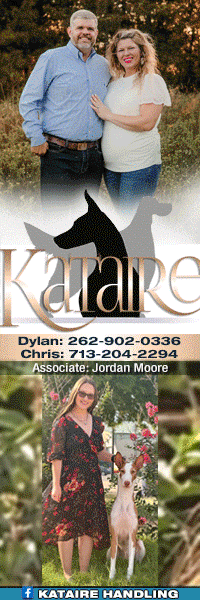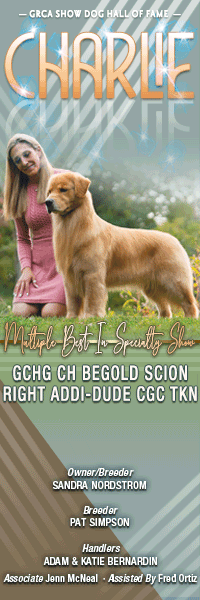Questions For A Dog Psychiatrist
By Chris Robinson
According to most psychiatric journals, a problem exists when there is a discrepancy between what you are doing and what you would like to be doing. So, when there is a discrepancy between what my dogs are doing and what I would like them to be doing, it only makes sense to consult with a dog psychiatrist. But, before I shell out the big bucks for a consultation, it’s probably a good idea to compile a list of questions for which I need answers before any course of therapy can be considered.
1. Why would a 75 pound dog that ordinarily has absolutely no interest in sitting in someone’s lap suddenly become obsessed with the idea when a person is “enthroned” in the bathroom? There are many other occasions when that same person is sitting on a chair or the couch with both hands free that don’t elicit that same desire by the dog to be a lapdog. Even when invited to sit on the couch next to someone, the dog never has any interest in crawling into a lap unless it’s a necessary action to enable reaching across that lap to gain access to the gummy bears in a dish on the arm of the couch. However, as soon as that objective is achieved, the dog immediately retires to a position alongside the person, not in their lap.
But, no such retreat occurs if that someone is sitting in the bathroom. Under those circumstances nothing seems to discourage the dog’s efforts to be a lapsitter. Pushing them away only causes them to redouble their efforts to accomplish their objective. Not even a broadside of profanities that would dissolve an anvil has any deterrent effect. Along these same lines, why would a dog that wouldn’t otherwise be caught dead carrying around a pair of skivvies want to play tug-o’-war with yours when they are still firmly anchored to your body during a bathroom visit?

“Satisfied that they have succeeded in their mission to get me out of the shower, they immediately retreat from the door and within seconds are fast asleep on their pillows or the couch depending upon how the mood strikes them.”
2. Since we’re on the subject of dogs and bathrooms, why do dogs that barely acknowledge your movement from one room to another with, at most, a lazily raised eyelid instantly leap to their feet when it appears you are headed for the bathroom? It’s easy to understand why they would eventually stroll into the kitchen when you are headed in that direction, especially when they hear pots and pans clanging about, but the bathroom? Unlike the kitchen, there never has and never will be anything remotely resembling food on the bathroom floor. The only things on that floor are wet towels and they cannot possibly hold any allure for a dog remindful as they are of baths, a bête noire for most of the dogs I’ve known. Not only do they jump up when there’s any indication you might be on the way to the bathroom but they also insist on providing close escort and walking point, intent upon saving you because they, and only they, can sense precisely where Al Qeada has planted the IEDs beneath your carpeting and the exact location of the ambushes the terrorists have planned from behind the couch and chairs along the path to the bathroom. The fact that you may want and need to make haste in achieving that objective means nothing to the dogs in their self-appointed role as your bathroom bodyguards as they attempt to herd you away from the hazards they know are concealed along the route. Nothing including cries of “Gethehelloutofmyway” which rise in volume and pitch (as your desperation trying to avoid something that hasn’t happened since you were two-years-old) grows will deter them from completing their mission to save you from the perils that lurk along the route to the bathroom.
3. How can a dog that doesn’t so much as twitch when you rattle three rounds of 12 gauge ammunition through the shotgun practically right over the dog’s head come totally unglued when they hear a faint rumble of thunder from a storm that’s probably a good 50 miles away? They certainly don’t suffer from “noise phobia” or they’d never tolerate gunshots. It’s also not like any of them have ever been caught outdoors in a bad storm. In fact, as soon as a few raindrops appear on the window, if the dogs happen to be outside, they are let into the house immediately, if for no other reason than that most wet sporting breeds are decidedly aromatic. Besides, it’s difficult to withstand the pitiful looks I get if their coat should even become slightly damp from rainfall. Remember now, I’m talking about retrievers that jump into any sizable body of water every chance they get to swim happily about for hours. Also, if we should happen to encounter rainstorms while we are hunting that would need to diminish considerably before they could be called cloudbursts and would cause most folks to begin looking up the definition of “cubits” in preparation for ark building, not only are they not bothered by their “drowned rat” image but they frolic about in it. Meanwhile, their human companions, despite being togged out in the finest available foul weather gear, are seriously contemplating taking up a different sport.
4.Why does flipping the switch of my electric toothbrush to the “on” position cause both dogs to immediately start howling a wild, high-pitched aria that winds up somewhere in the vicinity of “A” above high “C?” I say “vicinity” because neither is exactly on pitch but rather more comparable to the sound of fingernails screeching across a blackboard. Nothing I can do seems to convince them that the toothbrush is not some sort of death-ray machine that is part of a diabolical plot to involve them in a satanic ritual. This occurs even when the dogs happen to be downstairs and the toothbrushing is occurring in the upstairs bathroom. How they can even hear the barely audible buzz of the toothbrush when I’m in one end of the house on the second floor with the bathroom door closed and they are sound asleep in their dog dens on the first floor in the other end of the house is beyond me. But hear it they do and the first tiny hum of the toothbrush when the switch is moved to “on” provides the downbeat for the discordant howling symphony.

“They get to go swimming during the summer months and usually there are fetching games involved in the ‘pond time.’”
5. I need to know why the dogs always begin their furious SOMEONE’S-AT-THE-DOOR assault when I’m in the shower. They keep up their frenzied barking which crescendos until I climb out, throw on the bare minimum of covering, and race to the door dripping water all over the carpets. When I arrive at the door, I find that not only is no one there but there has probably been no one there for at least two days. Satisfied that they have succeeded in their mission to get me out of the shower, they immediately retreat from the door and within seconds are fast asleep on their pillows or the couch depending upon how the mood strikes them. A stream of profanity that exceeds the temperature of molten lava seemingly poses no deterrent to either the false someone’s-at-the-door alarms or to their desire to return to naptime once they’ve achieved their desired outcome. “Ah,” says the eminent shrink, “Then why don’t you just ignore their warnings and remain in the shower until you’ve finished?” The answer to that is quite simple: Because every time I have disregarded their alarm barking, there has actually been someone at the door and inevitably it is someone that I badly need to see like the dryer repairman, the electrician, the FedEx man with an order containing a vital part for my computer that absolutely has to be signed for, or the kid who has come to clean up the dog yard.

“Regular visits from a bobcat are needed to fill up holes on a fairly regular basis in order for the dogs to have places to dig.”
6. Why are there never enough holes in the dog yard to satisfy my dogs? No matter how many they have dug, they always seem to need one or two more. It’s gotten so that I have to get a Bobcat (that’s a machine folks, not the wild feline) to fill up the holes on a fairly regular basis in order for the dogs to have places to dig. It’s not as though they have any reason to be bored. They get plenty of playtime along with regular games of fetch or find the dummy. They also frequently get to go swimming during the summer months and usually there are fetching games involved in the “pond time.” They are not deprived of petting sessions. Heaven knows they don’t need to dig to find a cool place to lay. If the weather is not to their liking, they simply scratch on the door until I let them into the house which has central air-conditioning and is a constant 70 degrees. If they don’t wish to come in, there are a number of old growth trees, both deciduous and coniferous, to provide shade. The yard also covers most of an acre and is in full view of the driveway so there are frequently vehicles to escort the length of the fence, if they so desire, and they frequently do. There are no rodent holes in the yard as all the chipmunks live in the brushpile at the north end of the yard and there are no gophers in that area. There are even occasional turtles that wander through the yard to provide barking entertainment. So, it’s difficult for someone who is not a dog to understand the need for so many holes.
It is a well-established tenet of psychiatry that one of the keys to dealing with what you are doing as opposed to what you’d like to be doing is knowing exactly why you are doing whatever you are doing instead of what you’d like to be doing. It follows then that if you know why the dogs are doing the things they are doing, it is possible, at least theoretically, to change that behavior. But, is knowing the “whys” worth the $400/hr that dog psychiatrists get for their analyses? And, if I know the “whys,” is it worth all the effort that will be needed in the faint hope that it will be possible to get them to change? Now those are the real questions and odds are that not even the canine equivalent of a combination of Sigmund Freud, Alfred Adler and Carl Jung would have the answers.
Short URL: https://caninechronicle.com/?p=30683
Comments are closed












